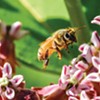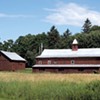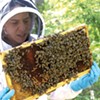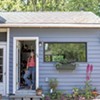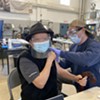Published June 30, 2021 at 10:00 a.m.
We've Got Kayaks!
A big thank-you to Seven Days and its readers for recognizing our efforts at Outdoor Gear Exchange during this wild year and for the generous highlight in "Pandemic All-Stars: What Outdoor Store Helped You Gear Up for Adventures?" [June 9].
While this past year has been challenging for all of us in so many ways, it has been such a joy to see Vermonters look to us and the outdoors as outlets in the midst of the heaviness of this pandemic. We are so grateful to be a part of such a respectful and dedicated community, and I hope we get to see all of you out on the lakes and trails enjoying your new gear.
I happily write to inform you of a correction in the original article, though. We still have kayaks, canoes and paddleboards for sale! While the supply-chain issues you've read about in the news have certainly affected OGE, we have options for recreational day paddlers, weekend warriors and even the anglers out there. If buying isn't in the cards, we also have rental SUPs and a canoe to enjoy, as well!
We wish you a safe and fun-filled summer, and our staff look forward to getting you ready for your next adventure — and seeing your smiling faces.
Virginia Farley
Monkton
Farley is paddling manager at Outdoor Gear Exchange.
Small House, Big Team
[Re Nest: "Accessorizing Your Home," June 16]: It is an honor to be in Nest, and I thank Amy Lilly and photographer Luke Awtry for taking the time to bring the story of my dream to print.
I just wanted to point out two things from the article: First, Nikkita — my "roommate," as Luke called her — prefers "she/her" pronouns versus the "him" pronoun mentioned in the article. All good; Nikkita has been around a long time, and she has been called many things...
Second, I want to thank Amy for mentioning that I did a great deal of the work on the accessory dwelling unit myself, but I want to clarify that I was able to do it with the support of amazing folks like Matt of Haven Mechanical, Derek and his crew from Rob Shea Carpentry, Peter from Chevalier Fire Protection, and endless friends like Cheri, Lindsey, Colin, Alex, Brian and my sister, who donated time, tools and vehicles to transport what I needed to the job site, as I did this all without owning a car.
And a thank-you to my neighbors, who endured days of construction noise, dust, debris and swear words when I hit my thumb with the hammer. It takes a village, and I am so grateful for my village.
Amy Magyar
Burlington
'Thorough Reporting'
[Re "Biased Badges?" June 23]: I appreciated the thorough reporting on this sequence of events, and it occurs to me that you might have made a comparison on how differently this might have been dealt with had Shelburne Farms been the source of the concerns raised.
Maura Randall
Milton
Good Buzz
[Re "The Bees' Needs," June 23]: Your Pollinator Issue was brilliant, as was Mike Kiernan's comment, "It's in diversity that we'll find resilience," and Spencer Hardy's: "There's so much basic stuff we don't know about bees."
Pollinators and biodiversity are appearing more and more on folks' radar, perhaps just in time, as we recognize the incredible value we receive from nature and begin to respond in kind.
It is time we get to know a little about the pollinators and what we can do to provide them more of the habitat they need.
So, after planting Vermont historic (native) plants for five years, I am now observing and cataloging insect species in our backyard. I have walked 100 miles in our one-acre backyard, and still surprises await me every day. In one month alone, I observed 133 species of insects. Posting photos of them on iNaturalist allows me to view them closely and learn their names. Every day some of them wow me.
The more we know about the life around us, the more we will appreciate the services they provide and the almost incomprehensible beauty of sight and behavior that life exhibits.
Observing insect life in our backyards gives us the chance to get to know our natural-world neighbors, who do so very much for us. It is like going to the zoo, without the cages, to see a diversity of life in its natural habitat and bring home photos to share with neighbors and friends — and scientists.
Bernie Paquette
Jericho
Nothing to Show
[Re "Kicked to the Curb," June 16]: Maybe this excellent reporting by Chelsea Edgar and Seven Days will help reveal to legislators the ineptitude of the state's preparedness and management, as well as the callous mismanagement by so-called "community partners," by which economic services regional managers cover for themselves and each other in a mutual back scratch among the paid staffers — the real welfare cheats — pretending they have a plan while denying compassionate support, shelter and dignity.
To have already spent these gross amounts of federal money yet admit they have no real economical plan developed for how to reinvent support services, dignity and opportunity for the unhoused is bordering on criminal neglect.
Stephen Whitaker
Montpelier
Get Parkway Right
The Pine Street Coalition is pleased that its hard work on a redesign of the Champlain Parkway was recognized and discussed in the May 26 issue of Seven Days ["'Right Way' or the Highway"].
However, it is not accurate to assume Burlington Mayor Miro Weinberger and the coalition are in complete agreement. The mayor favors a design that dates back to the 1960s. A lot of changes in people's lifestyles and driving habits have occurred since then that make the original design obsolete.
The coalition has met with local and state highway officials and Gov. Phil Scott to show them our plan. Now we are ready to meet with the mayor and show him a plan that includes the latest social and environmental criteria, including protected bike and pedestrian lanes.
Our design does not include a direct paved ribbon to downtown that would encourage higher speeds and slice through the King-Maple neighborhood. The vitality of a city is not measured by tall buildings and streets clogged with cars. To continue down this path is the worst of conventional thinking.
Many cities that jumped on the bandwagon for downtown transportation projects with ring roads and expressways now admit it was a mistake and face the cost of demolition. We need to get the Parkway project right the first time.
Jack Daggitt
Burlington
Street Unwise
[Re "Kicked to the Curb," June 16]: In February 2020, a homeless man named Thierry Heuga died sleeping under a Bennington bridge in the cold. A month later, COVID-19 hit.
When the pandemic burst into Vermont, our legislators spent around $44 million to house Vermont's homeless population in motels for the duration of the crisis. Instead of people out on the cold streets during a pandemic, Vermonters were able to remain relatively safe in motels. Our state and our legislators should be immensely proud.
I was filled with hope that Vermont would come close to ending homelessness due to our great response to it during the pandemic. However, Gov. Phil Scott has ended the state of emergency that existed during the pandemic’s harshest months, meaning the motel program is coming to an end for many individuals — about 700 people — on July 1.
The Thierrys of Vermont are now being pushed back into the street.
With a nonchalant shrug, Vermont has turned its back on our homeless neighbors. In our rush to get back to normal, many of us just have the ability to turn the other way and not look at the issue of homelessness.
Legislators and those with power: If you don't act, all you'll have to do is look under a bridge in any given town and see the issue of homelessness alive and well. I hope you can take this as a call to action to make change before our streets are once again beds for thousands of our neighbors.
Addie Lentzner
Bennington
Don't Forget TB
[Re Off Message: "Vermont Closes In on Vaccination Goal — and Considers Sending Shots to Canada," June 1]: Now that we have reached the 80 percent vaccination rate and restrictions are beginning to be lifted, it is time for global aid to recommence. Sending excess vaccines to help reopen the U.S.-Canadian border is essential in getting our world vaccinated, yet we also need to set a renewed focus on continued global issues that COVID-19 has delayed progress on.
According to sources, tuberculosis eradication has been set back five to eight years due to the reallocation of financial resources to COVID-19. With this, 83 percent of countries have reported that TB personnel have been reassigned to the COVID-19 response. This also shows that further TB cases have gone unidentified due to this lack of attention, and now TB deaths and infection rates may not have decreased, they have just gone unreported.
U.S. Sen. Patrick Leahy is no stranger to this; he has used his position to ensure global funding in many places, including making sure that the Global Fund to Fight AIDS, Tuberculosis and Malaria is protected. TB is also no stranger to Vermont; between 2003 and 2015, the state had a shocking total of 77 TB cases. This is an issue around the world and clearly one happening in our state right now. Therefore, we are asking for Sen. Leahy's support to make sure that additional global funding is properly allocated for TB specifically.
Evi O'Hara-Short
Burlington
Love Seven Days
I lived in Vermont when I was a staff photographer at the Burlington Free Press from 1979 to 1986 — its heyday and, quite frankly, my heyday, too. I read Seven Days daily. So sad to learn that Green Mountain College, Southern Vermont College, Marlboro College and the College of St. Joseph have all closed. But heartened that Goddard College just got a new president and hopefully may revitalize the college [Off Message: "Goddard College's New President Vows to Revitalize the Struggling School," June 24]. It is a very worthy endeavor, and I hope that you will have good news consistently regarding Goddard's comeback.
I love your ground-up coverage of my favorite state. I believe I am subscribed to all four of your newsletters.
Irene Fertik
Los Ranchos, NM
'Such a Conundrum'
["Fight of the Honeybee," June 23] claims that dairy farmers use neonicotinoid-laced seeds in order to protect the corn and soy they plant to feed their cows. Cary Giguere, from the Agency of Agriculture, Food and Markets, tries to make the case that they are balancing infrastructure and sustainability to avoid the need for farmers to plant more crops in the absence of the neonicotinoids, which would lead to more runoff of phosphorus into Lake Champlain.
Such a conundrum! Destroy the lake or kill the bees! Why not include the third part of the equation? Cows are iconic to Vermont, and, if they were treated better, we might almost think they were sacred cows. But they're not. They are artificially inseminated every time their milk slows down and forced through another pregnancy, only to lose their offspring so that humans can use the milk meant for their babies.
Cow's milk is not sustainable when farmers are dumping "product" because the market is glutted and the price is tanking. The main purchaser of milk is the U.S. government; this milk is foisted on children in schools and Native Americans in reservations.
The handwriting is on the wall with the increased popularity and availability of plant-based milks. But we are stuck in our image of Vermont as a dairy state. And in doing that, we get to choose between killing the bees or further damaging Lake Champlain — and in 20 years, losing the dairy industry anyway.
Barbie Alsop
Burlington
More By This Author
Comments
Comments are closed.
From 2014-2020, Seven Days allowed readers to comment on all stories posted on our website. While we've appreciated the suggestions and insights, right now Seven Days is prioritizing our core mission — producing high-quality, responsible local journalism — over moderating online debates between readers.
To criticize, correct or praise our reporting, please send us a letter to the editor or send us a tip. We’ll check it out and report the results.
Online comments may return when we have better tech tools for managing them. Thanks for reading.





































